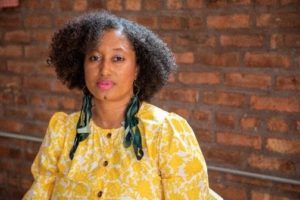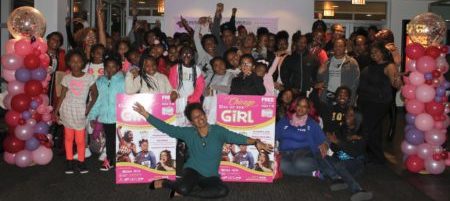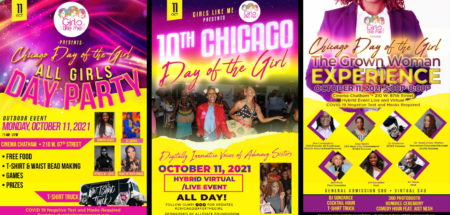La’Keisha Gray-Sewell is an internationally recognized urban girls advocate, media literacy expert, and speaker. She founded the Girls Like Me Project, Inc. to train girls in media literacy and empower them. The Girls Like Me Project has served over 700 girls through its transformative programs and vents. A graduate of Southern Illinois University-Carbondale advocates for girls and is unapologetic about raising healthy and liberated black girls. Inspired by volunteering at her child’s school, she noticed “mean girl” and hypersexualized behavior from young girls as young as 4th grade and began gathering young girls together initially through a book club that grew into something even bigger.
 In 2011, the United Nations declared October 11 as the International Day of the Girl to recognize girls’ rights and the challenges girls face around the world. La’Keisha Gray-Sewell decided October 11 would also be the Chicago Day of the Girl. So she created Chicago Day of the Girl to connect Chicago’s inner-city girls to a global community and advocate for their success beyond the myriad of injustices. This free event features spectacular cultural entertainment, community resources sharing, food, interactive fun, games, raffles, prizes, moderated panel discussions, and workshops.
In 2011, the United Nations declared October 11 as the International Day of the Girl to recognize girls’ rights and the challenges girls face around the world. La’Keisha Gray-Sewell decided October 11 would also be the Chicago Day of the Girl. So she created Chicago Day of the Girl to connect Chicago’s inner-city girls to a global community and advocate for their success beyond the myriad of injustices. This free event features spectacular cultural entertainment, community resources sharing, food, interactive fun, games, raffles, prizes, moderated panel discussions, and workshops.
The Chicago Defender spoke with this inspiring advocate about mentoring young black girls and what they need in today’s climate.
Chicago Defender: What is the “Girls Like Me” Project?
La’Keisha Gray-Sewell: We are an organization that serves black girls specifically and unapologetically ages 11 to 18. We help them critically examine the social, political, and cultural ideologies found in the media. We also help young girls push back against the stereotypes and the stigmas that influence their self-worth and how policymakers write policies and procedures.
We help them understand why the media is used as a tool for that kind of propaganda. We give them the tools to create their own stories and narratives, find value in themselves and each other, and use the media advocacy tool for each other as a bar for sisterhood.
Chicago Defender: What are young black girls telling you about their experiences?
La’Keisha Gray-Sewell: They tell me that their teachers don’t give them a chance to be wrong. They can’t just make a mistake. It’s like their whole being is a mistake if they just make one mistake. People don’t allow them just to be free and be children. So many of them can’t leave their neighborhoods without being portrayed as if they don’t belong. They feel that. These girls just want to be young girls.

Chicago Defender: I think of young black girls and their self-image, especially in this age of social media? Are the young girls you work with dealing with body image issues?
La’Keisha Gray-Sewell: Absolutely. We have girls who are 13 and 14 but have the bodies of 25-year-olds. They often speak about grown men gawking and making comments to them. It makes them feel ashamed and uncomfortable. They want to hide their bodies and hide who they are because they don’t want grown men acting like creeps, looking at their hips and thighs. It’s just unfortunate. They don’t like it. They aren’t seeking this out, and I hate that at 12 or 14 years old, young black girls are dealing with this.
“I’m not trying to change train girls to go into jobs or get them ready for schools or colleges. I’m getting those places ready for them. Our girls need to know they have the power to change those places to become less centered on whiteness. I teach our girls they bring the value and the flavor and not let the world forget it”. –La’Keisha Gray-Sewell
Chicago Defender: How does the Girls Like Me project help young black girls struggling with so much?
La’Keisha Gray-Sewell: Our organization focuses on media literacy. However, we understand that we can’t do anything unless you are healed and feeling complete. So with every session we have, we begin with affirmations and meditation. Then we help them feel their sense of self-worth. It’s about finding things about themselves they love, and everyone plays a role in encouraging them and giving them those affirmations. Hearing their fellow sisters encouraging them and telling them what they love about them allows them to find affirmations for themselves.
We also have “her-story” moments. We take and look at those who’ve come before us. We look at some of the things these women have faced, look at how they’ve overcome, look at their background, where they came from, and find the commonalities between them and our girls. We find women that we can hold up to them and say, “Well, look, if this woman did this, if this black woman was able to do this, you are every bit as capable because you are made of the same thing.” Between our meditations, our affirmations, and her-story moments, we pour into them.
Chicago Defender: How does media play a role in the self-image and self-esteem of black girls?
La’Keisha Gray-Sewell: We teach the girls about media literacy, helping them understand who is shaping these storylines and narratives. You’ll find if you trace the money, you will find someone who makes a profit off of making you feel less than. Their value increases from devaluing you. We teach our girls this. Once they understand that, they can flip the script and take that power away.
Chicago Defender: It has to be hard for young black girls, especially with social media?
La’Keisha Gray-Sewell: It is. Society teaches them that they have to be responsible for how adults behave. They can’t control an adult; they can control themselves. It doesn’t matter if they are 12 and wearing a halter top. That should have no bearing on how an adult, male or female, treats them. It goes beyond sexuality too. Black girls are taught that they cannot have emotions. We can’t be sad or mad or pout because we get told we have an attitude. No, I’m unhappy. I’m uncomfortable, just like every adult feels. When they express that, they are deemed disrespectful or seen as having an attitude problem. No, they need a moment. Just like you needed a moment when your boss was talking crazy to you. Right?
 Chicago Defender: We teach our girls about the “superwoman” syndrome early in life, it seems.
Chicago Defender: We teach our girls about the “superwoman” syndrome early in life, it seems.
La’Keisha Gray-Sewell: This is why we also work with mothers. We do a workshop called “Raising Black Girl Magic.” So many of us are raising girls without healing that childhood trauma. We continue to raise our daughters with the same bad practices, not that we don’t love them, but we just don’t know better sometimes. Our role is to make sure that the mothers in our program also understand how to allow the girls to flourish, thrive, and do so that they are allowed to be whole and complete without being broken down.
Chicago Defender: What is the “Chicago Day of the Girl,” and what plans do the “Girls Like Me” project have to commemorate the event?
La’Keisha Gray-Sewell: When the United Nations declared October 11 as the International Day of the Girl, it focused on global girls’ empowerment. When the day was spoken about, it would be about girls in Cambodia, Sri Lanka, Nigeria, Bangladesh, etc. They would talk about what girls in these areas were experiencing, such as gender violence, sex trafficking, no access to education, living without essential resources such as water, etc., and I felt like girls in Chicago are experiencing the same thing and should be involved in this global conversation.
Our Chicago Day of the Girl event celebrates everything our young girls are and strive to be. This will be our biggest year to date, and I’m so excited about it. We are celebrating the fact that black girls are thriving, and we’re going to bring together black women so that more of us can find a safe space to be ourselves and do it for our daughters.
We have a day event and an evening event. The day event will be free for the girls. If you purchase a ticket to the evening event, you will also be covering the expense for a girl to attend the day event, so it’s a win/win for everyone. During the day event, the girls will practice yoga meditation and plant flowers and seeds that they will take home to grow and nurture. That helps to teach them self-care. In addition, the girls will make waist beads and t-shirts, enjoy some fitness activities and of course plenty of dancing. We have a 17-year-old teenage girl this year as our DJ. Our evening show includes a comedy show by Just Nesh and our awards ceremony for this year’s honorees.
Chicago Defender: How can the community get involved with the Girls Like Me Project?
La’Keisha Gray-Sewell: First, we want the community to purchase a ticket because it sponsors a young girl to attend the day party. Then we want the public to visit our website, www.girlslikemeproject.org, and sign up to volunteer or make a donation. We need women who can help be facilitators during our sessions. There are many ways to help.
 The Girls Like Me Project’s 10th annual Chicago Day of the Girl will be held on Monday, October 11. For tickets visit, www.girlslikemeproject.org/chicago-day-of-the-girl.
The Girls Like Me Project’s 10th annual Chicago Day of the Girl will be held on Monday, October 11. For tickets visit, www.girlslikemeproject.org/chicago-day-of-the-girl.
This year’s honorees include:
- Star Cunningham – CEO 4 D Healthware-Mission Accomplished Honoree
- Alisa Starks- CEO Inner City Entertainment-Digitally Innovative Advocacy Sister Honoree
- Ericka “DJ Sundance” Ingram-Digitally Innovative Advocacy Sister Honoree
- Dr. Venus Evans Winter- Author, Researcher, Girls Advocate-Digitally Innovative Advocacy Sister Honoree
- Dr. Joseph Strickland- Senior Research Specialist, Jane Addams Center for Social Policy and Research-Authentic Ally Awardee
Danielle Sanders is a journalist and writer living in Chicago. Find her on social media @DanieSanders20 and @DanieSandersOfficial.
